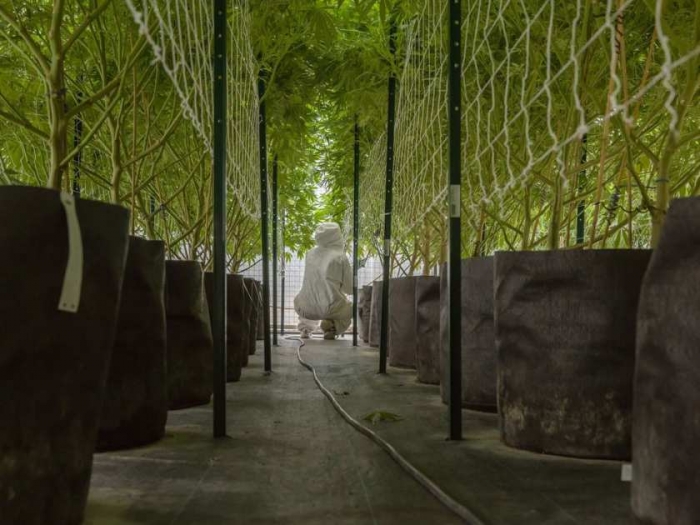You are here
Home 🌿 Medical Cannabis News 🌿 Hydropothecary Says a Former Employee Sprayed Cannabis Plants with Banned Pesticide 🌿Hydropothecary Says a Former Employee Sprayed Cannabis Plants with Banned Pesticide

A medical marijuana grower in Gatineau says it has found the source of a banned pesticide that tainted its products, causing the company to temporarily stop sales and issue two recalls.
The Hydropothecary Corporation says an employee sprayed “a small number of plants” with myclobutanil, a pesticide not approved for use on cannabis, without the company’s knowledge or approval.
The employee was not identified. But he no longer works at the Health Canada-licensed facility in Masson-Angers, about 40 kilometres northeast of Ottawa, Hydropothecary said in a news release late Tuesday.
In May, the company halted sales for two weeks and recalled some products after a Health Canada spot check found traces of myclobutanil on plant leaves.
In the latest announcement, Hydropothecary expanded the recall to include dried cannabis from some lots sold to customers between July 15, 2015, and March 24, 2017, that tested positive for myclobutanil.
Health Canada has deemed both recalls as Type III, which means exposure is “not likely to cause any adverse health consequences.”
Myclobutanil is sometimes used by illegal growers to control mildew. It is approved for use on some fruits and vegetables, but not for cannabis and other plants that are smoked.
In the past few months, five of Canada’s 45 medical marijuana growers have been found using unapproved pesticides, including myclobutanil.
Last month Health Canada cracked down, ordering all growers to conduct pesticide testing.
Hydropothecary spent a month trying to find the source of contamination, testing samples from all harvests as well as plants, soil, water and equipment.
The company said its investigation concluded the tainted cannabis was grown before Sept. 16, 2016. The evidence suggests the plants were sprayed before the company’s new head grower and team were hired, it said.
No dried cannabis produced since then shows signs of myclobutanil contamination above levels set by Health Canada, the company said.
“We are very sorry this occurred and we have been hard at work to ensure it never happens again,” company chief executive Sébastien St-Louis said in a statement.
Hydropothecary published a long list of preventive procedures it was putting in place, such as requiring mixing and preparation of products used on plants to be witnessed by two people.
The latest recall: Dried cannabis sold between July 15, 2015 and March 24, 2017. The lots are numbered: 8, 17, 21, 27, 28, 29, 31, 42, 43, 97, 106, 107, 108, 110, 111, 116, 117, 121 and 125.
The May recall: Dried cannabis sold between Feb. 1, 2016 and May 1, 2017. The lots are numbered: 45, 46, 47, 54, 58, 59, 102, 109, 123, 127, 128, 129, 148 and 150.
420 Intel is Your Source for Marijuana News
420 Intel Canada is your leading news source for the Canadian cannabis industry. Get the latest updates on Canadian cannabis stocks and developments on how Canada continues to be a major player in the worldwide recreational and medical cannabis industry.
420 Intel Canada is the Canadian Industry news outlet that will keep you updated on how these Canadian developments in recreational and medical marijuana will impact the country and the world. Our commitment is to bring you the most important cannabis news stories from across Canada every day of the week.
Marijuana industry news is a constant endeavor with new developments each day. For marijuana news across the True North, 420 Intel Canada promises to bring you quality, Canadian, cannabis industry news.
You can get 420 Intel news delivered directly to your inbox by signing up for our daily marijuana news, ensuring you’re always kept up to date on the ever-changing cannabis industry. To stay even better informed about marijuana legalization news follow us on Twitter, Facebook and LinkedIn.





